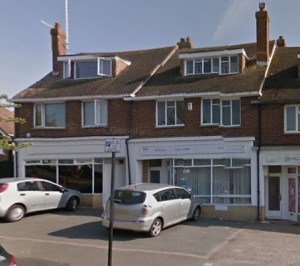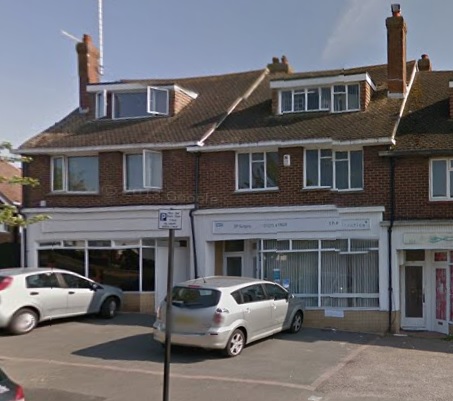A doctors’ surgery in Hove has been graded inadequate in an inspection report published today (Thursday 3 December) and placed in “special measures”.
The Care Quality Commission (CQC) criticised The Practice Hangleton Manor, in Northease Drive, Hove.
It said: “Patients were at risk of harm.” And it added: “The practice did not have a clear system in place for identifying children at risk.”
The small surgery was placed into “special measures” for six months. It will be inspected again within six months and if it hasn’t improved may face closure.

GP (general practitioner) Silvia Menth had given notice before the inspection, moving with her partner to the West Country at the end of September.
The vacancy has been advertised but no one has been appointed to replace Dr Menth yet.
Locums are in place until the new year. Other local surgeries have reported difficulties in recruiting GPs.
The practice nurse Mina Richardson was off work but has since returned. The surgery’s owner The Practice PLC believes that this will bring the return of some stability.
The CQC report opens with a letter from the chief inspector of general practice Steve Field summing up the watchdog’s criticisms.
The report said: “We carried out an announced comprehensive inspection at The Practice Hangleton Manor on (Tuesday) 8 September 2015.
“Overall the practice is rated as inadequate. Specifically, we found the practice inadequate for providing safe, effective and caring services and for being well led. It was also inadequate for providing services for all of the population groups. Improvements were also required for providing responsive services.
“Our key findings across all the areas we inspected were as follows:
- Patients were at risk of harm because systems and processes were not in place to keep them safe. For example the practice did not have a clear system in place for identifying children at risk. Risks to patients in relation to referral and appointment systems had not been adequately considered.
- Risks to patient’s health were not always managed.
- Staff were clear about reporting incidents, near misses and concerns and there was evidence of investigation, however, learning and communication with staff was not consistently apparent.
- There was insufficient assurance to demonstrate people received effective care and treatment. For example QOF performance data was significantly lower for the practice than the clinical commissioning group (CCG) or national averages. Reviews of chronic disease management were undertaken in an opportunistic rather than planned way, and there were no comprehensive plans in place to address poor patient outcomes.
- There was no comprehensive system in place to recall and review patients.
- There were no multidisciplinary meetings held to discuss vulnerable patients. Palliative care meetings had begun to take place although the practice had not adequately identified patients who were nearing the end of life.
- The practice did not have a clear system in place for sharing information with ambulance or out-of-hours services for patients with complex needs.
- The practice had a plan for nurse-led health promotion campaigns for the year and had demonstrated success in identifying people at risk of dementia and providing appropriate health checks for these patients.
- Nursing staff participated in meetings with other nurses working within The Practice group/Chilvers and McCrea Brighton based practices. We saw evidence that these meetings included discussions around service planning and training with an emphasis on better meeting the needs of patients.
- Patients we spoke with were positive about their interactions with staff and said they were treated with compassion and dignity. However there was evidence from other feedback sources that this was not consistently the case. It was unclear how the practice had responded to this feedback.
- Patient feedback about consultations with nursing staff were positive, with the practice scoring above average in terms of nursing staff giving patients enough time and involving them in decisions about their care.
- The practice did not undertake a patient survey and it was unclear how feedback from the Friends and Family test and national GP patient survey was used to improve services for patients. The practice was involved in a multi-site practice patient participation group but there was no evidence of how this influenced changes within the practice.
- Patient privacy and dignity was not sufficiently considered in relation to the environment.
- Urgent appointments were usually available on the day they were requested, however these were mostly telephone consultations. Patients said that they sometimes had to wait a long time to receive a call back from the GP and information for patients regarding the appointment system was unclear. Patients could not book non-urgent appointments without having had a telephone consultation with the GP first.
- There was a lack of leadership capacity within the practice to make the required changes to improve patient outcomes and experience.
- Systems used to monitor the quality of the practice were inconsistent and not being used effectively to improve the service.
- There were insufficient action plans to improve patient outcomes or satisfaction.
- The approach to performance, quality and risk was inconsistent.
- The practice had undertaken 79 per cent of health checks for eligible patients aged 40 to 75.
- There were effective medicines management and infection control processes in place within the practice.
“On the basis of the ratings given to this practice at this inspection, I am placing the provider into special measures.
“This will be for a period of six months. We will inspect the practice again in six months to consider whether sufficient improvements have been made.
“If we find that the provider is still providing inadequate care we will take steps to cancel its registration with CQC.”
To read the 33-page report in full, click here.
The Practice is part of a chain of 50 general practices owned by The Practice PLC (formerly the Practice Network).
It includes The Practice North Street, based in the Boots branch at the Clock Tower, in Brighton, and The Practice Whitehawk Road, in Brighton. Both practices were graded as “requires improvement” when the CQC published reports in September.
It also includes The Practice Willow House, in Heath Hill Avenue, Brighton, which was graded as good in a report published in June.









